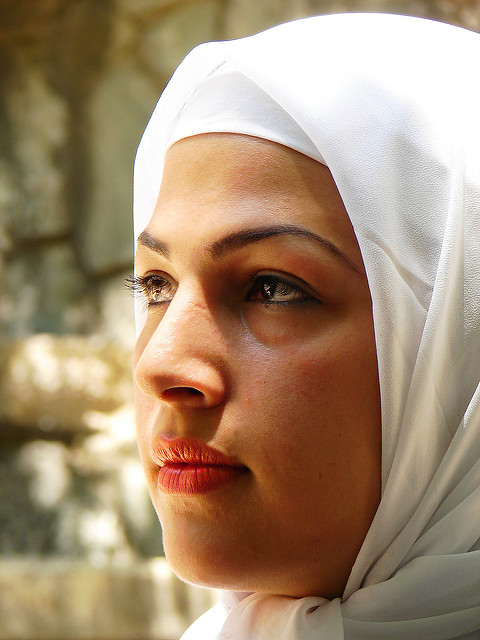“Don’t come near her.”
These were the first words of the man holding the kalashnikov—an automatic rifle. He blocked my mother from moving any closer. Through a veil of tears, I watched the two men standing over the woman on the ground. She was having a seizure.
“She’s going to die,” my mother pleaded, beads of sweat appearing on her upper lip.
“Then let her die,” the man in fatigues said simply. A newborn kitten’s cries filled the air.
Now this wasn’t a scene from some amped-up high school play or a war story from a faraway land. This was my front yard right after a birthday party. A birthday party!
You see, a few years before, the people of Iran had decided that their government wasn’t working for them. They were tired of their country being “weak.” They wanted independence from foreign-owned companies. They wanted freedom. And they wanted God to guide their laws.
Don’t judge them too harshly. After all, they’d had it up to here with the fear of tyranny, the status quo, and a government that wasn’t listening to them. So they put an outsider in charge of the country.
The man in charge promised more freedom than we would know what to do with. He promised more jobs. He promised to end corruption and to clean the swamp. What we didn’t know was that our revolt against the establishment was going to set us back 1,400 years.
It started with a murmur of worry, a tiny fracture in our boundless optimism. Whispers surfaced that opposing views wouldn’t be tolerated by our new government. Surely that was paranoid nonsense, we thought, but before we could remember former civil rights, newspapers were shut down and people of a certain religion were targeted as the enemy of the state. Those who rose to the position of power were tragically similar in their rampant sexism, fanaticism and lack of qualification.

Women’s rights were cut in half and just like that, half the population became second-class citizens. When women took to the streets to protest, they were tear gassed, hit over the head with batons and jailed. The men who stood up for those women were also hit, maybe even more severely, and jailed. In a corner, Margaret Atwood stood silently and took notes for her Handmaid’s Tale.
When we were in the throes of a war and getting killed by the thousands every day, it occurred to us that we had signed up for this change without reading the fine print: Membership is limited. Transaction fees are variable. Certain restrictions apply.
What kind of restrictions?
Unbelievable ones such as hosting and attending a normal birthday party. The woman shaking on the ground was, by the way, our neighbor, who was terminally ill with Lymphoma. She had gathered all her strength to throw her 16-year-old an illegal birthday party. Why was it illegal? Because it allowed the guests the luxury to imagine that they were free to do as they pleased.
Earlier that night, I sat in the corner of her house as the guests, who had momentarily left their woes behind, were busy laughing and dancing. But I couldn’t enjoy myself. A bad feeling was burning in my stomach, pinning me to the chair. At age 11, while girls on the other side of the world bragged about their latest piercings, I was sporting an impressive hole in my stomach that kept me up at night. This ulcer didn’t afford me any bragging rights, but it dutifully warned me of all things that could go wrong. And at that party, there were plenty of things that could go wrong: Unrelated men and women in the same room, check. A vodka bottle, check. Dancing, check. Music, check.
In what nightmarish inferno was music illegal?
We often revisited the fantasy that this was a just a bad dream. It was as if the baby we had so desperately hoped for had turned into a vengeful, erratic monster. Protestors were labeled as terrorists and punished by the “Unscrupulous Activities Committee.”
We weren’t even allowed to talk about injustices. Disagreements between family and friends became weaponized and they turned against one another. Some began using weather as a code for their anxiety about the state of affairs. Soon the men in fatigues came after those who asked the question: “Do you think the weather will change?” And then we watched in horror as scores of people were tortured and executed without trial.
We tried to choose our battles. With our ideals and dreams about freedom dead and buried and an actual war raging, we could feel death’s cold kiss on our necks. So why not risk and squeeze a little joy out of this miserable horror show called life? Why not have a party?
Just then, a disturbing wave of panic spread to the whole house as someone screamed three dreaded words: “Men in fatigues!” Now, everyone’s belly felt like mine.
It is quite remarkable what the human body can do under stress. Like trained athletes, the guests, including old women, jumped the wall into our yard. Their feet bare, some limping from a bad landing, they ran to the street. Some caught cabs, others walked home, trying their best to look inconspicuous.
As one would expect, our neighbor’s cancer was not her ally during the raid. She was the last one to come over the wall and by that time, two men in fatigues had caught up.
“Please, she is sick,” my mother pleaded.
“So?” said the short one as the other turned his rifle toward us. “We need to search your house,” he said without missing a beat. My mother gestured with her open hand toward the house, but even I could hear her heartbeat.
The summer before, I had witnessed a wild dog sink his teeth into the back of a kitten, shaking the little guy furiously. I wanted to free the poor thing, but every time I stepped forward, the dog growled and shook the kitten even harder until its body went limp. When the quiet guard wouldn’t let us help our neighbor, I felt the same bitter bile of helplessness in my throat.
“Let’s go!” said the short one. “And if you have bottles of alcohol, chess sets, playing cards or contraband literature, you will get whipped, jailed and who knows what else…” his agitated words, like bullets of a machine gun, sprayed over the yard. It was as if he had grown weary of giving the same speech for the thousandth time to unruly children who were intent on defying him. He motioned with his gun for us to move.
Although we were dying to do so, my mother and I didn’t look back at the woman on the ground. Instead, holding each other’s sweaty hands, we watched the men in fatigues tear up our house.
We had some playing cards hidden in the basement, but our cat, who had just given birth to kittens stared at them with her wild green eyes and they turned away. I buried my head in my mother’s chest, muffling my sobs of relief. I could feel my mom’s warm breath on my ear as she whispered, “The cat saved us.”
The short one, disappointed that he hadn’t found anything juicy, asked why we were harboring fugitives.
“We did no such thing,” my mother explained. “All of a sudden people jumped over the wall into my house and into the street. What was I supposed to do?” she mustered her most indignant voice. “She is innocent. They probably jumped the wall into her house too!” she pointed to our neighbor who was now lying motionless under the willow tree.
Our neighbor survived that night, but died shortly after. Instead of talking about it, my mother and I went about our lives.
This was our new normal.
Lifetimes later, in another land, sitting in my safe and comfortable living room, I call my mother. She is now in her 80s. Her bright voice ripples with a wave of concern. “Will the cat save us this time?” she asks.
~
~
Author: Ari Honarvar
Image: Amir Farshad Ebrahimi/Flickr; Hamed Saber/Flickr
Editor: Catherine Monkman












Read 2 comments and reply